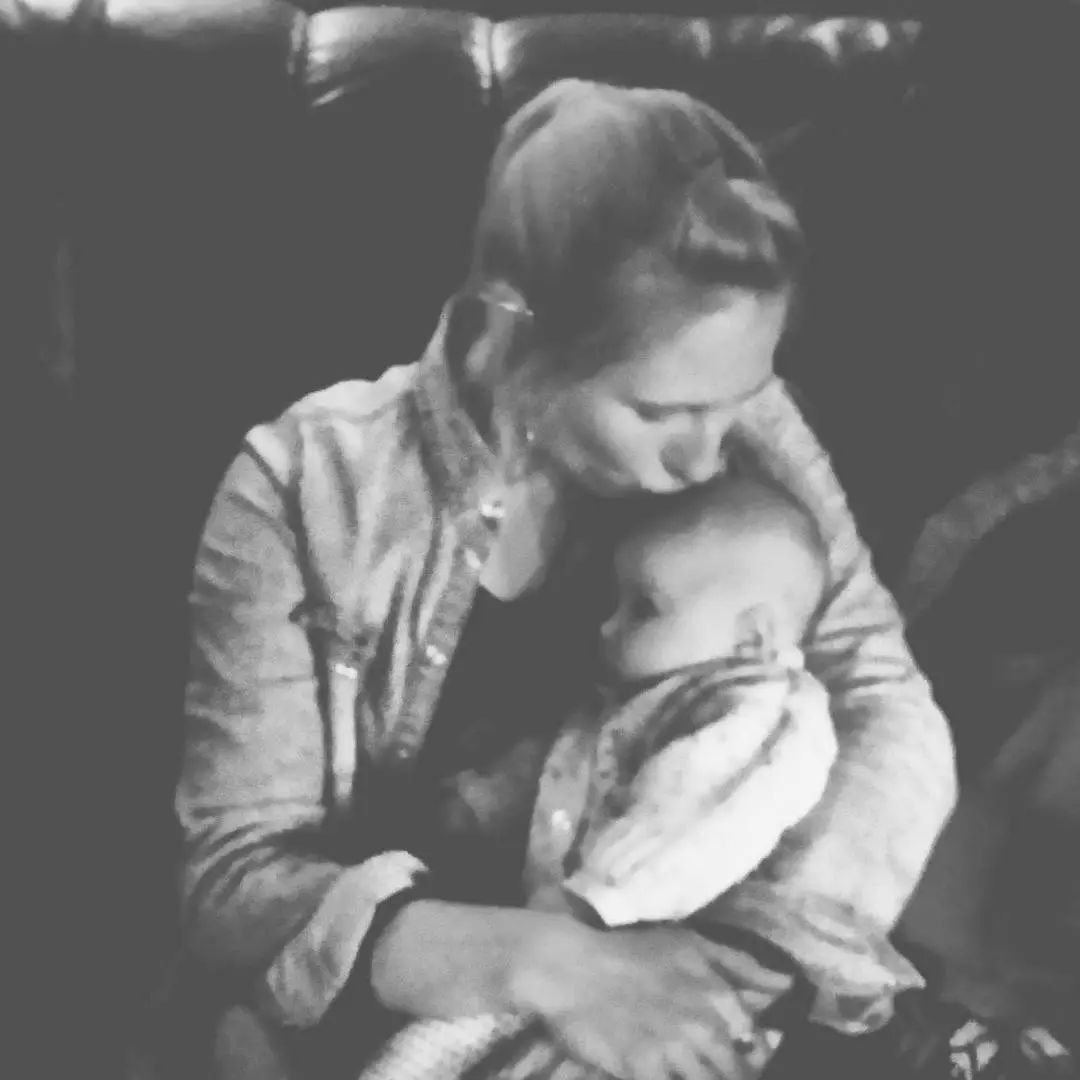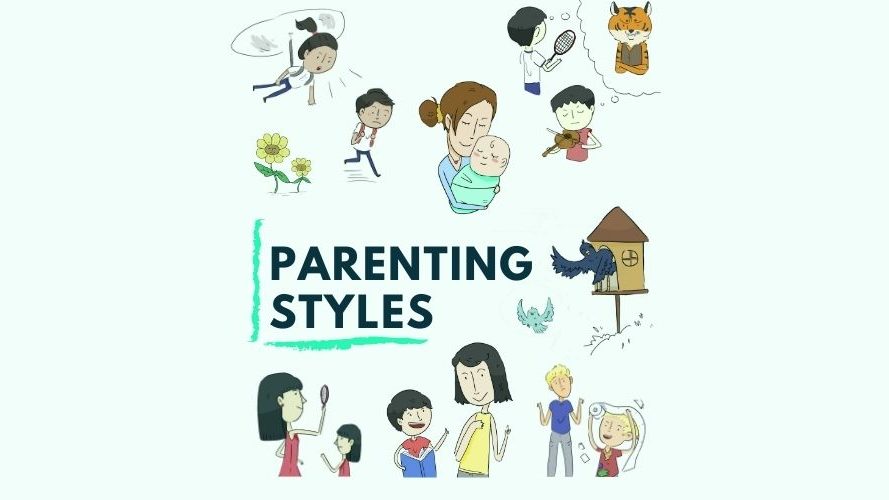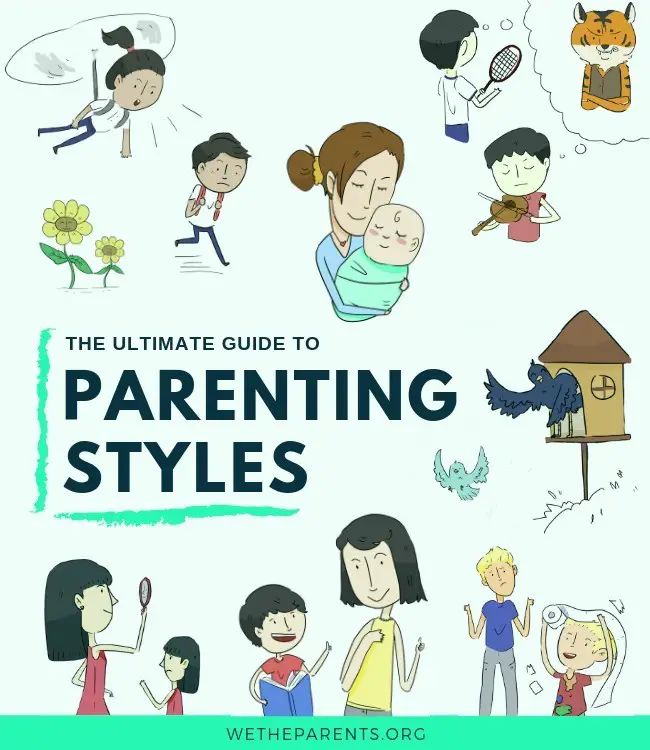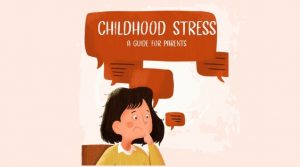Parenting is a complex endeavor. This won’t come as news to anyone blessed with a love of children, but what may be surprising is how our choice – or lack thereof – of parenting style can influence our children’s emotional health and quality of life as they grow.
In the ongoing conversation about what parenting style is best, it’s easy to feel caught in an echo chamber. Opinions and personal experiences sometimes seem to dominate the conversation over facts and figures.
Understanding some of the most common broad and specific parenting styles can help you identify your own skill sets and traits.
It can also help you identify problem points you’d like to work on, and discover ideas that your family could benefit from incorporating.
Ready to learn more? Let’s dive in.

In this article:
Baumrind parenting types
What type are you?
The four Baumrind parenting types, encapsulate the behaviors of just about every parent. These categorizations suggest that all parents fall into one of four categories based on the amount, or lack, of warmth and control they display when parenting.
These qualities are often based more on parental personality and environment than a specific parenting style structure. Understanding these four basic archetypes is essential to grasping more complex and nuanced styles of deliberate parenting.
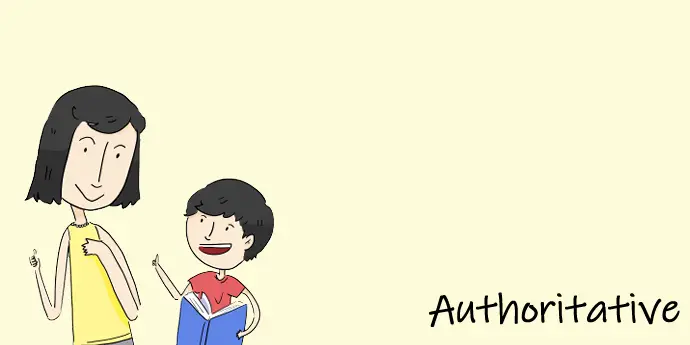
Authoritative parenting
Following the Golden Rule, authoritative parents value fairness and structure. They prize effort and dedication over ultimate success, holding high expectations for their children in terms of obedience and self-control.
They also use warmth and kindness with their children regularly, communicating expectations and affirmations of value without undermining structure or artificially inflating the ego. (Source)
Typical traits
- Communicates regularly with children about their activities, ideas, thoughts and feelings
- Handles situations and behaviors in a reasonable and consistent way
- Has high expectations of effort and dedication, with or without success
- Clearly communicates rules and expectations in a way children can understand
- Strict about following rules and expectations while remaining fair and empathetic
- Believes in teaching through structure and modeling good behavior by example
Outcomes & effects
- Increased competence and ability to follow and understand rules
- May demonstrate a higher level of maturity than other children
- Often better able to assert themselves when it comes to their rights, feelings and opinions
- Able to practice a greater level of self control thanks to consistent structure
- More able to engage in moral reasoning and make good decisions without relying on adult input
- May be more socially adept and better able to take on leadership roles
The science
Study: Patterns of Competence and Adjustment among Adolescents from Authoritative, Authoritarian, Indulgent, and Neglectful Families
Source: www.ncbi.nlm.nih.gov/pubmed/1756655
Finding: Among the four parenting styles studied, children of authoritative parents scored highest in psychosocial competence and lowest on measures of psychological dysfunction. Additionally, these children scored well on obedience indexes. Researchers concluded that there are modest but predictable differences in psychological and social functioning in children based on parenting style. Those from authoritative households are better adjusted and more competent, especially in the area of self-confidence.
Study: Effects of authoritative parental control on child behavior
Source: http://arowe.pbworks.com/f/baumrind_1966_parenting.pdf
Findings: Authoritative parents show high levels of warmth and control. Children are directed in a rational and issue-oriented way. There is firm control from the parent, but there are not overwhelming restrictions. Authoritative control can help achieve conformity with group standards while maintaining autonomy. This style of parenting uses a moderate approach with high standards, a nurturing personality, and respect for children’s independence.
Study: Person versus process praise and criticism: Implications for contingent self-worth and coping
Source: scinapse.io/papers/2154797511
Findings: This study shows the impacts of authoritative parenting techniques. Parents who avoid reprimanding kids tend to raise resilient learners who are better problem solvers. Encouraging self-reliance and independency in children also are linked to resilience and problem-solving. It can also improve emotional health.
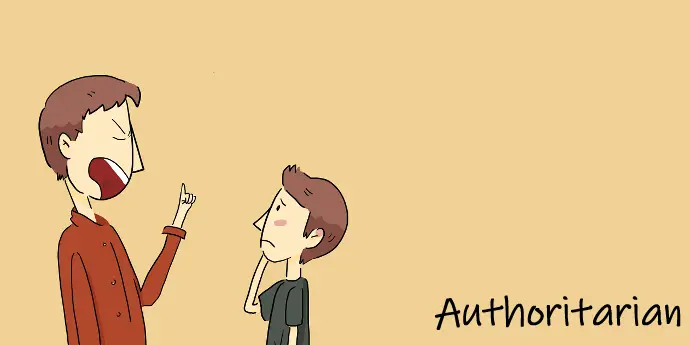
Authoritarian parenting
Controlling and strict, authoritarian parents are often associated with some of the more controversial intentional parenting styles.
They take a strong stance on being in charge, having little interest in negotiating with children. A structured rules system is likely to exist in an authoritarian household, but its expectations may not be adequately communicated.
Violations are likely to result in punishment rather than discussion. (Source)
Typical traits
- Inflexible and strict when it comes to rules, unwilling to hear “excuses”
- High expectations of good behavior as well as academic and social success
- May be uncommunicative about expectations until a perceived failure occurs
- Can be cold and withholding in an attempt to control a child’s behavior
- Controlling about who children can see, what activities they can participate in, their wardrobe, music choices or other personal expressions
- Quick to punish in the event of undesirable behavior or events
Outcomes & effects
- Children often feel more hostile to both parents and peers
- May act out with delinquent behavior such as petty theft or truancy
- More likely to engage in rebellious behavior and attempt to circumvent control through dishonesty
- Self esteem issues are often present due to devaluation
- Anxiety often occurs before anticipated conflicts with the authoritarian parent(s), which can have a profound effect on mood, academic performance and socialization
- May experience symptoms of depression, such as loss of interest and feelings of hopelessness
The science
Study: Effect of Authoritarian Parenting style on self esteem of the child: A Systematic Review
Source: pdfs.semanticscholar.org/1dbe/3c4475adb3b9462c149a8d4d580ee7e85644.pdf
Finding: Authoritarian parenting is strict and uses a very rigid style of parenting with the objective of keeping children safe without consideration of the consequences. Researchers have demonstrated that the authoritarian parenting style has a negative effect on self-esteem, self-confidence, and security.
Study: Person versus process praise and criticism: Implications for contingent self-worth and coping
Source: scinapse.io/papers/2154797511
Finding: Children exposed to an authoritarian caregiver often perform poorly in school, specifically on problem solving tasks. This is because a common tactic of authoritarian parents is shaming a child for poor performance, particularly academic performance.
Study: Consequences of parenting on adolescent outcomes
Source: www.mdpi.com/2075-4698/4/3/506
Finding: Authoritarian parents show low levels of trust and tend to discourage open lines of communication. Verbal hostility is common, as well as power-assertive behvaiors. This leads to poor social skills, low self-esteem, and higher rates of depression in children.
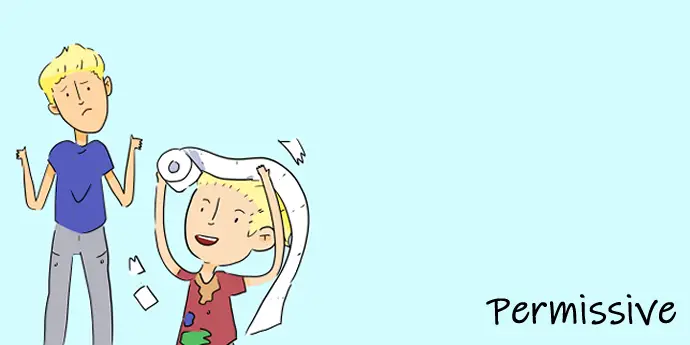
Permissive parenting
Exercising a great deal of warmth, but little control, permissive parents don’t often use the word “no”. They prize their child’s happiness over everything, which can lead to academic and social deficits in some cases.
Permissive parents are loving but feel they shouldn’t be deeply involved or control their child, especially after a certain age. Permissive parents are often children of authoritarian parents. (Source)
Typical traits
- Has minimal expectations of children, prioritizing their happiness over structure
- Does not have a rule structure in place, or does not enforce it
- Any punishments that exist are limited in scope and severity and may frequently or always lack follow-through
- Considers hands-off parenting to be the best way to show love and support of the individual
- May have low self confidence about parenting abilities or have issues asserting themselves
- In general, finds it difficult to say no
Outcomes & effects
- Children may demonstrate out of control behavior when introduced to a traditional social structure in which they have to conform to the needs and desires of others
- Boundaries are often lacking, leading to demanding and aggressive behavior in order to achieve goals
- Often leads to socialization issues, as other children are not quick to accept someone who demands to have their way without compromise
- May lead to academic issues if grades are viewed by the parent as unimportant
- Bossy behavior is common
- May have difficulty regulating impulsivity due to a lack of need for self control in day to day life
The science
Study: The impact of authoritative, permissive and authoritarian behavior of parents on self-concept, psychological health and life quality
Source: pdfs.semanticscholar.org/f1cf/b19c25271233726248a662b8766cd8341404.pdf
Finding: Permissive parenting is defined as being high warmth, but low on discipline and structure. There is little communication from the parent to the child, but a high level of communication from the child to the parent. Children raised with a permissive parenting style tend to have lower self esteem. Because of their dependency on their parents, they also tend to have poorer mental health.
Study: Patterns of competence and adjustment among adolescents from authoritative, authoritarian, indulgent, and neglectful families.
Source: www.ncbi.nlm.nih.gov/pubmed/1756655
Finding: Permissive parenting has been linked to increased alcohol use, misconduct, and lower levels of academic achievement.
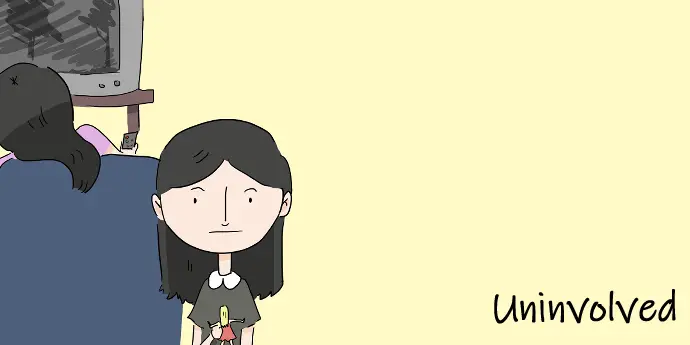
Uninvolved parenting
When parents are emotionally or physically absent, they are categorized as uninvolved parents.
They are likely to display a lack of warmth or control, seem disinterested in parenthood, and display little emotional reaction to either positive or negative events relating to their child.
Uninvolved parents are less likely to demand affection and obedience, and therefore less likely to punish in their absence. Broadly, this parenting style is associated with significant emotional problems and abusive situations. (Source)
Typical traits
- Often absent, whether physically or emotionally
- Does not show interest in being a parent
- Does not communicate with children, whether positive or negative
- Not willing to uphold rules and structure
- Lack of emotional response to both good or bad events in children’s lives
- Does not request or demand affection or interaction, and frequently rejects it when offered
Outcomes and effects
- Children may feel depressed, unwanted and lonely
- Often, an increased perception of rejection exists, causing significant social handicap
- Feelings of hostility toward parents, peers and self are all common
- Externalizing behaviors that demonstrate a lack of self worth may occur
- Some research shows that Attention Deficit Disorder and other cognitive issues are more commonly diagnosed in children of uninvolved or neglectful parents
- Delinquent behaviors like truancy, theft, smoking, drinking and drug use are all more likely to occur
The Science
Study: Children of depressed parents: An integrative review
Source: www.ncbi.nlm.nih.gov/pubmed/2200073
Finding: This study concluded that uninvolved parenting is linked with depression in children. This is mainly because the children become highly dependent on their parents, but their parents are not demanding or responsive to their needs.
Study: Parenting styles, coping strategies, and the expression of homesickness.
Source: www.ncbi.nlm.nih.gov/pubmed/17258804
Finding: The negative effects of an uninvolved parenting style persist into adulthood. Again because of their dependency on their parents, these children internalize problems more often and have less robust coping skills when facing a challenging situation.

Intentional parenting styles
Theories, proponents, effects
Beyond broad parenting styles, some parents choose to engage with specific practices and guidelines when interacting with their children and creating a home structure. These styles can vary significantly.
Some parents are strong proponents of one intentional parenting type, while others cherry-pick the best and most relevant qualities of the ones that reflect their values, personality, and child’s needs.
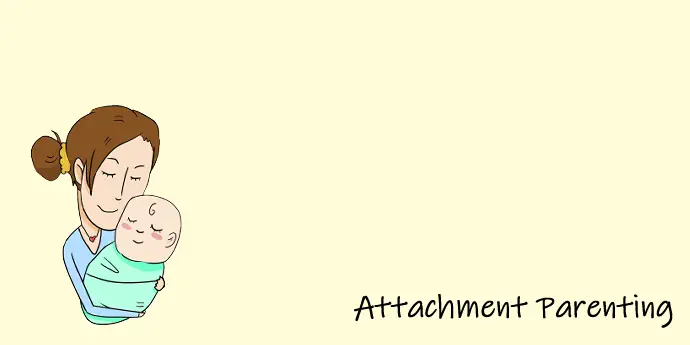
Attachment parenting
Attuned to their child’s unique needs, attachment parents believe in fostering and maintaining an early bond. This centers around proximity, nurturing touch, and emotional support.
Babywearing, co-sleeping, and a lack of forced weaning are all hallmarks of attachment parenting, which espouses the idea that forcing independence on babies and toddlers can be damaging.
Characteristics
- Intuitive and responsive, learns about child’s unique needs and expressions and responds to them quickly and respectfully
- Uses frequent nurturing touches to build a bond and create reassurance
- Strives to create a deep, special, life-long bond with child by offering a strong caregiver bond
- Understands child’s nonverbal communications and is able to respond by meeting their needs
- Flexible and willing to adapt quickly and significantly with a priority focus on child’s physical and emotional needs
- Very present without attempting to hinder independence
Goals
- Creating empathy in children, making them better able to relate to others
- Generating natural feelings of compassion
- Allowing children to feel more naturally connected with others
- Creating a calm mental state with limited impulsivity and less drive toward emotionally negative behaviors
- Instilling emotional confidence in children that extends to their abilities and socialization
- Building independence by helping children feel safe and protected as they explore the world
The Science
Study: Understanding Attachment: Parenting, Child Care, and Emotional Development
Source: psycnet.apa.org/record/2005-15752-000
Finding: Through attachment parenting, children are given the confidence to explore the world on their own with the trust that their parents will always be there for them. There is a lower likelihood of developing fearful tendencies throughout development.
Study: More than maternal sensitivity shapes attachment: infant coping and temperament
Source: www.ncbi.nlm.nih.gov/pubmed/17347364
Finding: Children exposed to attachment parenting are more likely to have their needs addressed. Attachment quality is influenced by multiple factors, the most important of which is maternal sensitivity to the child’s needs.
Study: Individual differences in young children’s IQ: a social-developmental perspective
Source: www.ncbi.nlm.nih.gov/pubmed/10190346
Finding: Children from attachment parenting households on average scored 12 points higher on the Stanford-Binet intelligence test when compared to insecurely attached children.
Ups & downs
Potential Pros: Thanks to an early bond, children of attachment parents are more likely to be connect easily with others and practice empathy and compassion without effort. They may have an easier time controlling impulses.
Possible Cons: This style can be especially demanding for new parents and parents of multiple kids, who may find a lack of personal space exhausting. Additionally, it has been argued that some children may have a more difficult time with separation anxiety, which can be difficult to manage when they reach school age.
Key advocates

References
- https://www.askdrsears.com/topics/parenting/attachment-parenting
- https://www.positive-parenting-ally.com/types-of-parenting-styles.html
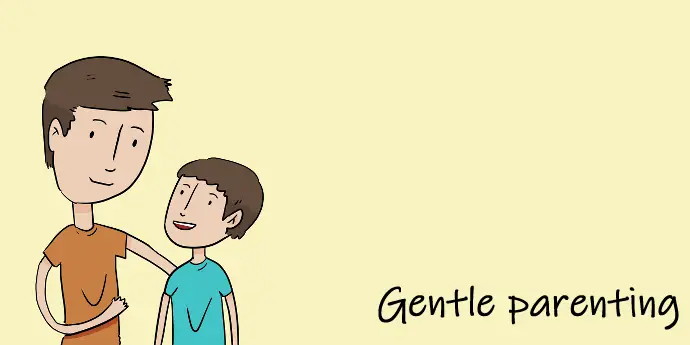
Gentle parenting
Under the umbrella of unconditional, respectful, and positive parenting, gentle parents aim to be responsive to their child’s needs and treat them as equals.
They view the quality of the parent and child relationship to be more important than being right or feeling that the child has been reprimanded.
They avoid using bargaining or positive/negative reinforcements, while, instead, encourag good behavior through the demonstration of respect and unconditional love.
Characteristics
- Takes child’s needs and personality into account when planning for all aspects of parenthood
- Tries to see child’s point of view in a situation by communicating with them in a rational way
- Reframes requests that go ignored rather than switching them to demands
- Offers unconditional love, does not use positive or negative reinforcement
- Prioritizes the quality of the parent and child relationship over the need to be right or take an authoritative position
- In conversations with children, listens more and talks less
Goals
- Teaching children self control through setting a good example
- Instilling confidence in communication that’s consistent and respectful
- Building maturity via comfortable admissions of fault and apologies
- Giving the instinct for compassion by extending it to children
- Offering a positive self image by reminding children that love is not conditional
- Increasing empathy for other people and situations, even in the face of frustration
The Science
Study: Moving from Rewards and Punishments to Love and Reason
Source: www.alfiekohn.org/parenting/punishment.htm
Finding: “If punishment is so effective, how come I have to keep doing it to my child over and over?”. The available research provides little evidence for the benefits of punishment and instead shows the destructive effects of corporal punishment in particular. It can make children more aggressive and is unproductive. Punishment fails because it increases anger, teaches that power is important, and will lose effectiveness over time. It also distracts children from the important issues and limits their ability to think critically about what they may have done wrong.
Study: A prospective three generational study of fathers’ constructive parenting
Source: psycnet.apa.org/record/2009-12605-006
Finding: Gentle parenting is also found to have a positive impact on future generations. This style of parenting protects against negative behavior and instills positive connections with others. This leads to an increased likelihood of that child using positive parenting techniques with their own children.
Ups & downs
Potential pros: Children of gentle parents may be more compassionate, less hostile and possess a greater aptitude for peer communication.
Possible cons: A common misunderstanding of gentle parenting can lead to permissive parenting. This occurs when parents avoid setting clear and firm boundaries. In these cases, a lack of any authoritative discipline can lead to a lack of self-discipline or children who don’t understand why they’re being punished if something serious happens.
Key advocates



References
- https://www.alfiekohn.org/article/rewards-25-years-later/
- https://www.janetlansbury.com/2018/05/single-answer-many-common-parenting-concerns/
- https://www.ahaparenting.com/parenting-tools/positive-discipline/positive-discipline
- https://theconversation.com/gentle-parenting-explainer-no-rewards-no-punishments-no-misbehaving-kids-31678
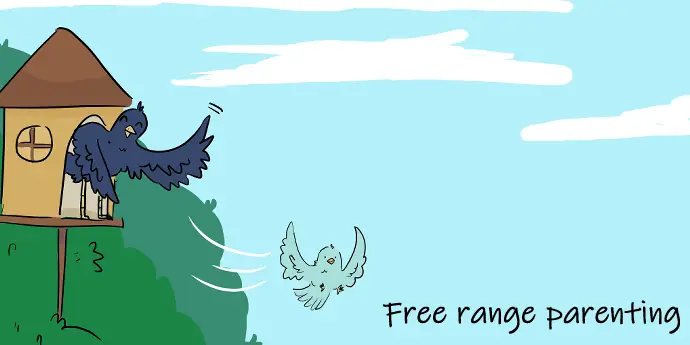
Free-range parenting
Advocates of early independence, free-range parents presume their children are smarter and more capable of thinking and acting independently than most others.
They encourage early independent exploration while discouraging ‘separation anxiety’ for all parties.
Free-range parents embrace the idea that the world is safer than we think, and that, in some cases, modern children are overprotected to the point of detriment.
Characteristics
- Encourages independence of thought and behavior
- Trusts child’s competence at doing more complex things alone
- Does not hover or over-involve themselves in their child’s pursuits
- Does not fear their child’s independence, values it instead
- Avoids overprotective behavior
- Less restrictive within reason
Goals
- Increased confidence in children’s ability to navigate the world
- Fostering independent, logical, morally sound decision making
- Building both social and practical skills that give children a real world advantage
- Creating a healthy parent and child bond with warmth but without over-reliance
- Limiting separation anxiety for both parents and children
- Developing maturity and responsibility for belongings and schedule
The Science
Study: Ten Ways to Restrict Children’s Freedom to Play: the problem of surplus safety
Source: journals.sagepub.com/doi/pdf/10.2304/ciec.2010.11.3.263
Finding: Play is an important part of a child’s growth and development. However, with increased control and limitations over playtime, there are negative consequences. Increased restrictions designed for increased safety expose children to “short and longer-term threats of illness and limit children’s life opportunities.” It is important to ensure that play areas are generally safe and spaces are children-friendly, but overprotectiveness can be detrimental.
Study: The risk that there is no risk: a simple, innovative intervention to increase children’s activity levels
Source: www.tandfonline.com/doi/abs/10.1080/09669760802699878
Finding: A hands-off monitoring approach where children are allowed to freely play without extensive supervision was been shown to help children become more social, creative, and resilient. Issues of “surplus safety” should be addressed at the individual, school, and policy levels.
Study: The Decline of Play and the Ries of Psychopathology in Children and Adolescents
Source: www.psychologytoday.com/files/attachments/1195/ajp-decline-play-published.pdf
Finding: Over the past 50 years, unsupervised children free play has decreased. During the same period, “anxiety, depression, suicide, feelings of helplessness, and narcissism have increased sharply”. Unmonitored play is important for a variety of reasons, including developing interests, learning self-control and getting along with others.
Ups & Downs
Potential pros: Children of free range parents are more likely to develop an independent nature, feeling more confident both socially and in practical matters thanks to a more deeply developed sense of logic and reason.
Possible cons: While this would be great in an ideal world, it doesn’t mesh with every kid’s personality and circumstances, and some are more likely than others to get involved with bad friends and situations when left unsupervised.
Key advocates

References
- http://www.freerangekids.com/faq/
- https://www.newyorker.com/magazine/2015/02/23/mother-may
- https://theconversation.com/from-tiger-to-free-range-parents-what-research-says-about-pros-and-cons-of-popular-parenting-styles-57986
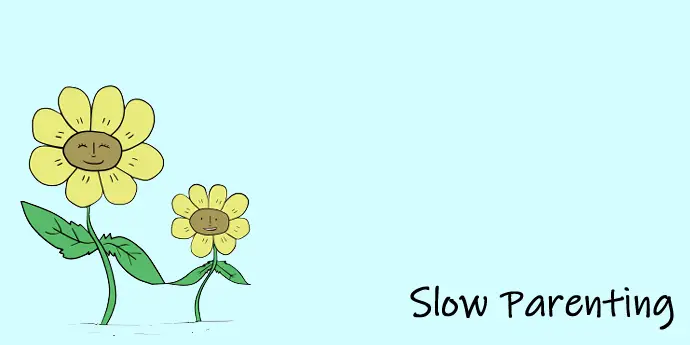
Slow parenting
Also called “simplicity parenting”, slow parenting looks to eschew hectic, highly varied schedules in favor of simplified, decluttered, and pared-down routines.
Excessive consumption of media, especially news and commercials, is avoided. The home space is kept minimalist and neat, easy-to-follow structures are established and plenty of time is made available for the whole family to rest and reflect.
Characteristics
- Avoids huge and hectic scheduled commitments that can cut into family time
- Leaves the TV off most of the time
- Encourages valuing emotional bonding and quality time over material objects
- Follows routines that don’t rush parents or children
- Makes decluttering and simplfying spaces a regular process
- Allows time for rest and reflection for the whole family
[/tab]
Goals
- Creating a childhood that kids can genuinely enjoy
- Preventing significant influence or concern from excessive exposure to the media and commercialism
- Offering plenty of time to explore, contemplate and reflect
- Preventing children from feeling excessively rushed or anxious
- Achieving authentic quality time with the family
- Making a peaceful and happy home space
The Science
Study: Examinng a conceptual model of parental nurturance, parenting practices and physical activity among 5-6 year old
Source: www.ncbi.nlm.nih.gov/pmc/articles/PMC4714610/
Finding: Parent nurturance was positively associated with modeling and support of the child during physical activity. There is also a “small mediation effect from parent nurturance through modeling to support children” in their levels of moderate physical activity. Thus, slow parenting could lead to more active children.
Study: Nurturant-involved parenting and adolescent substance abuse
Source: www.ncbi.nlm.nih.gov/pubmed/2921256
Finding: Nurturant parenting is “characterized by warmth, supportiveness, low hostility, and low rejection.” Results show that lower levels of nurturant parenting were linked with higher levels of social anxiety and decreased self-efficacy. This lead to increased substance abuse.
Study: The influence of the number of toys in the environment on toddlers’ play
Source: doi.org/10.1016/j.infbeh.2017.11.005
Finding: Research on simplicity parenting shows that having fewer toys can lead to increased focus, creativity, imagination, and deeper cognitive development. “Toddlers had a greater quality of play in the four toy condition compared to the sixteen toy condition.”
Ups & downs
Potential Pros: Children of slow parents tend to exhibit confidence and self sufficiency earlier, and may find it easier to remain calm in stressful situations.
Possible Cons: Much like free range parenting, slow parenting can lead to unsupervised time that’s not ideal for every child.
Key advocates


References
- https://www.simplicityparenting.com/the-movement-an-overview/
- https://www.telegraph.co.uk/education/3355928/Slow-parenting-part-two-hey-parents-leave-those-kids-alone.html
- https://parenting.blogs.nytimes.com/2009/04/08/what-is-slow-parenting/
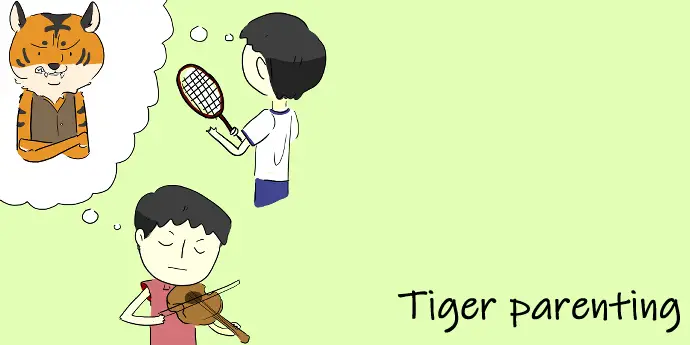
Tiger parenting
Famously associated with Eastern cultures, tiger parents believe that their children should be exceptional. Very high expectations for obedience, diligence, and results are common traits with these parents.
Tiger parents have a high level of control and a low level of warmth, making them classic authoritarian parents. For them, the use of insults or threats is acceptable behavior, if resulting in a ‘successful’ child.
Characteristics
- Demands perfection and top performance in academics and extracurricular activities
- Monitors children’s progress closely and exactingly
- Generally lacks warmth
- Uses negative reinforcements like removal of privileges as well as name calling and insults when perceived as necessary
- Has a strict, defined system of rules and order
- Expects obedience at all times
Goals
- Fostering success in children
- Increasing focus and dedication through unwavering pursuit of goals
- Possibly obtaining advantages in terms of future career opportunities
- Generating a sense of familial pride in a child’s accomplishments
- Raising disciplined children
- Teaching the value of hard work
The science
Study: Beyond parental control; authoritarian parenting style: Understanding Chinese parenting through the cultural notion of training
Source: www.ncbi.nlm.nih.gov/pubmed/7956468
Finding: This style of parenting has been linked with higher school achievement as high expectations are set for children. Tiger parenting is distinct from authoritarian parenting because tiger parens enjoy closeness with their children, providing evidence that their children are loved.
Study: Contexts of achievement: a study of American, Chinese, and Japanese Children
Source: www.ncbi.nlm.nih.gov/pubmed/2342493
Finding: A major tenet of tiger parenting is that effort, not only intelligence, is key to acheivement. This leads to a higher sense of self-efficacy, self-esteem, and resilience in the future. This type of parenting also leads to a strong support group around the child that supports achievement and hard work, important skills to develop.
Ups & downs
Potential Pros: Children of tiger parents may be more self disciplined and experience greater academic or extracurricular success than others, and may pursue skilled hobbies with more success and to a greater level of competence than their peers.
Possible Cons: Some tiger parenting methods can construe verbal and emotional abuse, leading to a very negative parent and child relationship, anxiety, feelings of inadequacy and a hampered social life. If there is not a clear and regular expression of love, then tiger parents can fall into the authoritative parenting category which has been shown to have negative outcomes.
Key advocates

References
- https://theconversation.com/from-tiger-to-free-range-parents-what-research-says-about-pros-and-cons-of-popular-parenting-styles-57986
- https://www.parentingscience.com/chinese-parenting.html
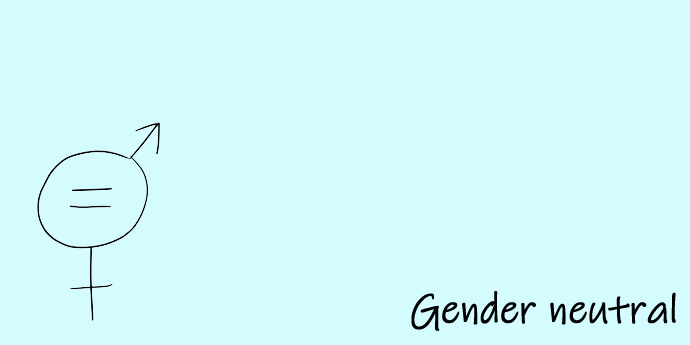
Gender neutral parenting
Shedding society’s expectations of gender binary behavior, gender-neutral parents encourage their children to make authentic decisions about their self-expression without unnecessary bias.
Some parents may choose to conceal their baby’s biological gender from all but those closest to them.
They’re likely to choose a gender-neutral name and provide non-gendered toys, allowing children to naturally gravitate toward their innate preferences.
Characteristics
- Doesn’t use gendered pronouns for child
- May conceal a child’s biological gender from everyone except the immediate family
- Avoids providing toys and colors that society views as gendered unless they are requested
- Allows child to choose the activities, toys and colors that are authentic to their personality
- Encourages child to embrace the gender identity, or lack thereof, that feels right to them
- Chooses a gender neutral name for child in many cases
Goals
- Raising children who are free of preconceived notions about their gender
- Allowing likes and preferences to be authentically explored and decided without direction or prompting
- Facilitating a conclusion on gender identity that lacks external influence
- Avoiding feelings of pressure to “perform” in a biological gender role
- Expressing the lack of need for people to be defined by gender
- Allowing children to express their chosen identity comfortably
The science
Study: Gender-Differentiated Parenting Revisited: Meta-Analysis Reveals Very Few Differences in Parental Control of Boys and Girls
Source: www.ncbi.nlm.nih.gov/pmc/articles/PMC4945059/
Finding: There is no consensus about the extent to which parents treat their sons and daughters differently. Parents are generally more controlling with boys, but the effect is very small. There was also no overall effect for gender different strategies found.
Study: Influence of Sex Stereotypes on Children’s Exploration and Memory
Source: asu.pure.elsevier.com/en/publications/influence-of-sex-stereotypes-on-childrens-exploration-and-memory-
Finding: Sex stereotypes were found to impose competence for children as children tend to remember more information about toys that are shown to be more suitable for their gender. Therefore, by gender limiting toys or activities, a child’s ability to develop a wide range of skills is limited as well.
Study: Sex beyond the genitalia: the Human Brain Mosaic
Source: www.pnas.org/content/112/50/15468
Finding: Sex and gender differences in the brain are often used as a justification for differential treatment of boys and girls. However, this study shows that brains are actually a mosaic composed of “masculine” and “feminine” features. Regardless, brains cannot be categorized into two distinct classes. Therefore, the differential treatment of boys and girls is not scientifically justified.
Ups & downs
Potential pros: The possibility exists for children of gender neutral parents to have a broader, more authentic view of themselves. They’re also less likely to engage in gender stereotyping and more likely to exhibit early confidence in their identity.
Possible cons: This parenting style may be difficult and confusing for the child, and may draw disparaging remarks and attention from less liberal parents. Children may also strongly desire to identify with their biological gender, and preventing them from doing so can be destructive.
Key advocates

References
- https://www.parents.com/parenting/should-you-raise-a-gender-neutral-baby/
- https://parenting.firstcry.com/articles/gender-neutral-parenting-is-this-a-right-approach/
- https://en.m.wikipedia.org/wiki/Gender_neutrality

Harmful parenting styles
Avoid these for the kids’ sake
Less positive or well-intentioned by far, unintentional parenting types generally exhibit behavior that’s detrimental to their children.
Sometimes this occurs in situations where mental illness, trauma, or difficult circumstances exist. At other times, a well-intentioned parent may simply intervene in their children’s lives in a counterproductive way.
These parenting styles can lead to significant, long-term emotional damage and should be avoided.
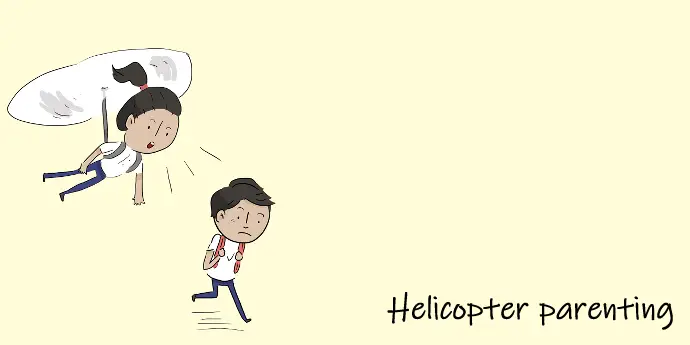
Helicopter parenting
Insecure and anxious, helicopter parents are unable to allow their children to be unsupervised.
They feel impelled to protect their child from the world and from the normal, sometimes painful, learning experiences essential to social and personal development.
They may intervene on behalf of their child in academics or socially, even when counterproductive, inappropriate, or, in some cases, when they’ve actually been requested to stop. (Source)
Characteristics
- Invasive, often pursuing involvement in a situation after they’ve been asked not to
- Controlling, feeling the need to direct and dictate child’s future and outcomes
- Refuses to let children make, and learn from, important mistakes that play a role in social development
- Attempts to intervene in the lives of older children, much to their chagrin
- Excessive involvement in child’s academics, attempts to negotiate or question grades
- Attempts to have an inappropriate level of involvement in child’s social and personal life
The science
Study: Love, Money and Parenting: How Economics Explains the Way We Raise Our Kids
Source: www.psychologytoday.com/us/blog/love-money-and-parenting/201902/introducing-love-money-and-parenting
Finding: An intensive parenting style leads to better outcomes for children. This was determined using several data sets and studies. There is a high correlation between student test scores and the intensity of parenting style. These children are also more likely to graduate from college and get graduate degrees.
Study: Childhood Self-Regulation as a Mechanism Through Which Early Overcontrolling Parenting is Associated with Adjustment in Preadolescence
Source: www.apa.org/pubs/journals/releases/dev-dev0000536.pdf
Finding: Overcontrolling parenting was negatively associated with emotional regulation and inhibitory control, leading to more child-reported emotional and school problems. “Parenting during toddlerhood is associated with child adjustment into adolescence through its relation with early developing of self-regulatory skills.” Children with helicopter parents may be less able to deal with challenging demands of growing up as they have increased reliance on their parents.
Study: Helping or Hovering? The Effects of Helicopter Parenting on College Students’ Well-Being
Source: link.springer.com/article/10.1007/s10826-013-9716-3
Finding: “College students of over-controlling parents report feeling less satisfied with family life and have lower levels of psychological well-being.” This is explained by the self-determination theory. “Students who reported having over-controlling parents reported significantly higher levels of depression and less satisfaction with life. Furthermore, the negative effects of helicopter parenting on college students’ well-being were largely explained by the perceived violation of students’ basic psychological needs for autonomy and competence.”
Ups & downs
Potential Pros: The actions of helicopter parents sometimes come from a place of great love and affection, however misguided their outcome.
Possible Cons: Most children will eventually resent a helicopter parent for their overinvolvement, and those that do not may become far too dependent on parental intervention in their adult lives. This can lead to anxiety and depression when they eventually leave home.

Snowplow parenting
Often determined to provide their children with an easier life experience than they had themselves, snowplow (or bulldozer,) parents continually remove obstacles to make things ‘easier’ for the child.
They’re likely to demand or negotiate unwarranted accolades, admissions, or places on teams for their child through social pressure, financial favors, or other means.
Snowplow parents are always trying to secure the best outcome for their kids, even if unmerited. (Source)
Characteristics
- Pushing and encouraging kids to follow through with opportunities they’ve created, even if child is uncomfortable
- Demanding special opportunities, positions and exceptions that are unearned for children
- Being dishonest or inappropriate in an attempt to leverage perceived advantages for children
- Enables dishonest behavior and the acceptance of unearned positions and accolades
- Lacks a sense of fairness and, as such, does not convey a sense of fairness to children
- Overbearing, often deciding on, planning and orchestrating their children’s lives even into young adulthood
The science
Study: Parent-child relationships and offspring’s positive mental wellbeing from adolescence to early older age
Source: www.research.ed.ac.uk/portal/en/publications/parentchild-relationships-and-offsprings-positive-mental-wellbeing-from-adolescence-to-early-older-age(5f5cdffa-b169-4350-a471-2128eaad405e).html
Finding: Children who are overly protected lack a sense of agency over their own lives and are more prone to developing unfulfilling relationships. Failure and learning to overcome problems are important parts of development
Ups & downs
Potential Pros: Children of snowplough parents may have access to academic, social and personal opportunities they wouldn’t otherwise, which can be advantageous down the line.
Possible Cons: When children have unearned rewards, they feel no sense of accomplishment or drive to achieve. They do not learn the values of effort or perseverance.
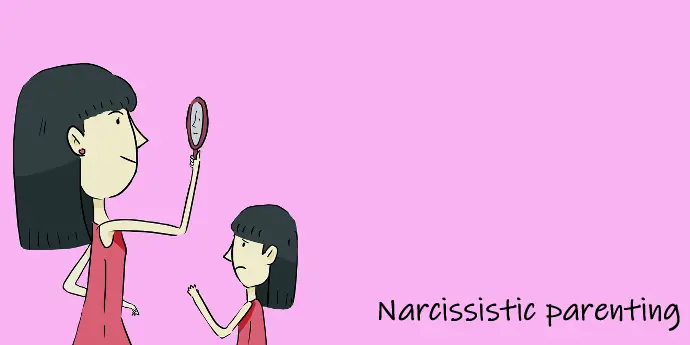
Narcissistic parenting
Largely ego-driven, narcissistic parents view their children as an extension of themselves. In their eyes, their children exist to meet their own physical and emotional needs and to be a source of narcissistic pride.
Narcissistic parents are likely to coerce or force their children to live out their own (parent) dreams, even when they’re not interested.
This parenting style often involves controlling, invasive, emotionally abusive, and withholding behaviors. It’s likely to be the result of narcissistic personality disorder or other mental illness. (Source)
Characteristics
- Sees children as an extension of their own person and ego
- Follows the classic abusive pattern of extreme affection followed by devaluation
- Attempts to live out personal goals and fantasies through children
- Often has huge tantrums, tirades or abusive episodes over seemingly small slights or disappointments
- May be invasive and inappropriate to the point of emotional abuse
- Generally suffers from Narcissistic Personality Disorder and/or other mental illnesses
The science
Study: Relationship between Parental Narcissism and Children’s Mental Vunerability
Source: www.ijpsy.com/volumen15/num3/420/relationship-between-parental-narcissism-EN.pdf
Finding: “Parental narcissism is related to children’s depression and anxiety and that this relationship is mediated by the rearing style as recalled by the offspring.” Both paternal and maternal narcissism are correlated with depression and anxiety in children. Parental pathological traints are indicators of children’s future mental health.
Study: Co-Narcissism: How we accommodate to narcissistic parents
Source: http://www.alanrappoport.com/pdf/Co-Narcissism%20Article.pdf
Finding: Narcissism is marked by people with low self-esteem who seek to control others for defensive purposes. Children of narcissistic parents work hard to please them and worry about how they are perceived. This leads to anxiety and depression. They are also more likely to take the blame for problems and fear being perceived as selfish for acting assertively.
Study: Transgenerational impact of narcissistic parenting
Source: www.pacifica.edu/dissertation-oral-defense/transgenerational-impact-of-narcissistic-parenting/
Finding: Narcissistic parenting is “defined as parenting that focused on using the child as a means of meeting the parents’ emotional needs”. Receiving narcissistic mothering has emotional consequences and negatively impacts parenting ability for the next generation.
Ups & downs
Potential pros: There is no real pro to this situation. Narcissistic parenting can lead to significant trauma for children. In the best cases, generally requiring extensive therapy, children of narcissists can go on to model their behavior to be opposite of their parents and be happy, loving adults.
Possible cons: Children exposed to narcissistic parents may face emotional trauma, PTSD, depression, anxiety and suicidal ideations.
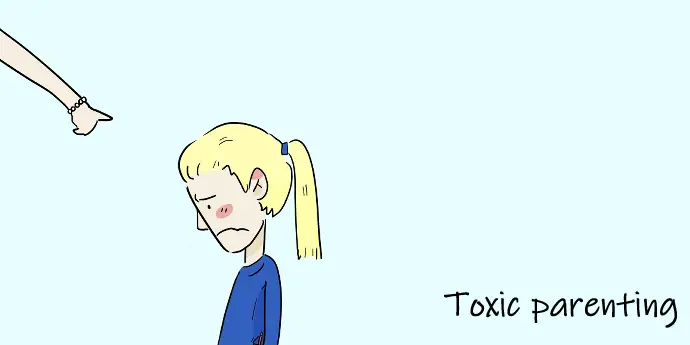
Toxic parenting
In the worst kind of parenting, toxic parents can be physically, mentally, or sexually abusive to their child.
In other cases, they may be allowing abuse to happen on their watch, or disbelieve and ignore a child’s reports of abuse.
Toxic parents are neglectful and uninvolved and may abandon their children emotionally, if not physically, by refusing to acknowledge their most basic needs. (Source)
Characteristics
- Actively physically, emotionally or sexually abuses child or allows abuse to happen unchecked
- Is neglectful about providing for long term needs like housing, clothing and education
- Lacks emotional warmth and fails to make children feel loved or safe
- May be physically and/or emotionally absent
- Ignores child’s immediate needs, such as food, water, sleep or access to a bathroom
- Treats parenting as low priority, if it is a priority at all
The Science
Study: Maternal Adverse Childhood Experiences and Infant Development
Source: pediatrics.aappublications.org/content/141/4/e20172495
Finding: Adverse childhood experiences arise from toxic parenting and lead to toxic stress where the wear and tear on the body leads to physical and mental health problems. The more adverse experiences a child had, the more likely they were to have developmental delays which limited school readiness, emotional health, and mental wellbeing. Dysfunction or toxic parenting leads to psychobiological effects that negatively impact the brain during sensitive time points of development
Study: The effects of toxic early childhood experiences on depression
Source: www.ncbi.nlm.nih.gov/pubmed/30562652
Finding: Toxic early childhood experiences are vulnerability factors to developing depression later in life. There are strong negative effects for physical and emotional abuse, neglect, low care, control, or maladaptive parenting.
Ups & downs
Potential pros: There is no pro to toxic parenting, which is a factor in the life story of many people struggling with drug addiction, criminal behavior and serious mental illness. While exceptionally strong people receiving the right kind of help may be able to rise above these circumstances, it is an exception, not a rule. Toxic parenting should never be normalized.
Possible cons: Toxic parenting can seriously damage children in a lifelong way. They may suffer from identity disturbance, depression, anxiety, suicidal thoughts or actions, physical and mental trauma, PTSD, ADD, anger issues and instability due to legal issues or removal to foster care.

